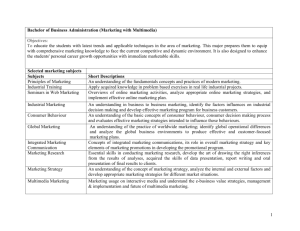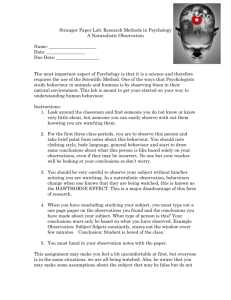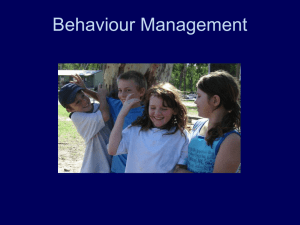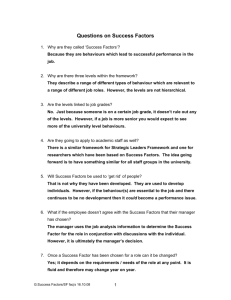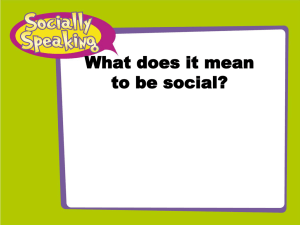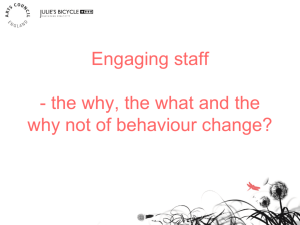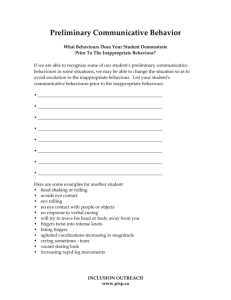Behaviour change: Getting Jeremy Clarkson to drive less
advertisement
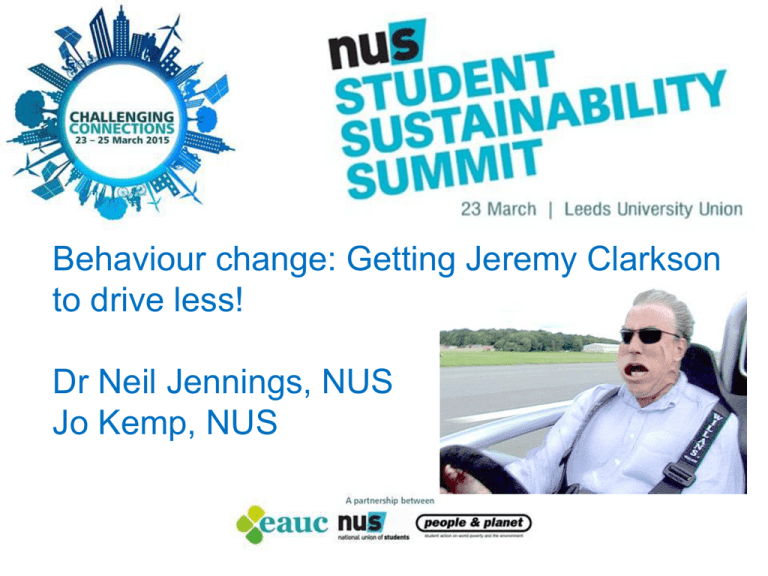
Behaviour change: Getting Jeremy Clarkson to drive less! Dr Neil Jennings, NUS Jo Kemp, NUS Overview • • • • • Why is behaviour change important? Why is it difficult Theories of behaviour change Social marketing approach Group work Why is behavioural change important? • Need to tackle climate change • Emissions and waste are caused by our behaviours • - 42% of UK carbon emissions are from direct action taken by individuals • Actions speak louder than words • It’s a good first step to changing attitudes • Benefits the individual What’s difficult about it? • • • • People are stuck in habits/routines They don’t think they will make a difference People don’t see themselves as ‘Green’ Some people haven’t made the first step Theories of change • No such thing as one unified discipline of behavioural change • Change is complex, and sometimes difficult to understand • Cross-disciplinary perspectives – psychology, sociology, anthropology, economics • Scale - individual to societal • Work of Andrew Darnton Economic theories of change • E.g. rational choice theory from economics focuses on individuals making choices based on costs/benefits of an action/behaviour. • People maximising their own level of satisfaction/happiness/personal benefit • Mathematical models to predict behaviours • Homo economicus – people as atomised beings acting in their own self-interest • Assumes that individuals have access to all necessary information Linear model of the valueaction gap Rational choice theory led to linear models of behaviour change e.g. the value action gap Environmental knowledge Environmental attitude Kolmuss and Agyeman (2002) Pro-environmental behaviour Value-action gap • Difference between what people say and what they do • Polar bears and SUVs Behavioural economics • Ideas from economics coupled with psychology • Recognises that humans aren’t always rational • E.g. tendency to overestimate the likelihood of high impact events and underestimate lower impact events (plane/car safety) Blake’s (1999) value action gap Blake (1999) Bypassing environmental concern? • Potential for us to look at ways to change behaviours through other mechanisms or non-environmental reasons • Address some of the barriers shown in the value action model • Cases where people have been compelled to change and it has changed their attitudes • e.g. smoking ban in UK 2007 - 26% of people smoked in 2007 compared to 19% in 2014 Social marketing “Using marketing techniques developed to get people to buy products to get them to change their behaviour, to the benefit of society” Multidisciplinary, draws on range of theories Recognises that human behaviour is complex Key principles of social marketing 1. Go beyond the usual suspects 2. Know the difference between sleepwalking and retail therapy 3. Defrost refreeze 4. Forget bridging the value-action gap 5. Change group behaviours 1. Go beyond the usual suspects • Need to adapt the message to different audiences • Use of segmentation 2. Know the difference between sleep-walking and retail therapy • We’re generally targeting unconscious behaviours – we need to make them conscious • Need to jog people out of their habits 2. Know the difference between sleep-walking and retail therapy • Visualise solutions and remind, remind, remind The right message • • • • • Clear, direct requests Empathy and imagination Solutions not problems Creative and positive Balance of language - make the good sound normal and the bad seem rare • Imagine what your audience want to hear The right messenger Who do you think is the best people to communicate with students at Uni? It’s YOU………you really are great, amazing, fantastic, wonderful, etc!!! 3. Defrost Refreeze • If they start changing their behaviour, • how do we get them to keep doing it? • - Feedback - let people know their actions make a difference (importance of measurables and metrics!) -Rewards (prizes/competitions) • - Consistency - “You’re obviously the kind of person who...” • Start small and step it up... 4. Forget bridging the valueaction gap Values don’t always translate into actions + = There is no magic bullet that leads from values to actions/attitudes to behaviours Fine to focus on changing behaviours for nonenvironmental reasons 5. Change group behaviours • People don’t change their behaviour if they think no one else is doing it • Challenge to make your behaviours seem like the socially acceptable/expected norm • Fun! Be the change! “Be the change you wish to see in the world” Ghandi Community Based Social Marketing Approach (CBSM) Environmentalist Doug McKenzie-Mohr Aims to change communities to help them to reduce their impact on the environment • Step 1: Uncover the barriers to behaviours, then, based on this information, select which behaviours to promote • Step 2: Design a program to overcome the barriers to the selected behaviours • Step 3: Pilot the program • Step 4: Evaluate the program once implemented Any questions? Group Exercise • Groups of 4-6 people • Each group will have a specific behaviour (energy, recycling, food or transport) • Come up with a campaign to tackle that behaviour • Fill in the planning document • Think about the tips/tricks from the Futerra report (e.g. defrosting old behaviours, refreezing new behaviours, visualising solutions, changing group behaviour) • 40mins • 2mins per group to present your idea back Final thoughts • • • • Be creative and innovative in your approach Reach out to those who aren’t already environmental Keep it fun! Keep in contact with us and each other Suggested reading Futerra (2007). New rules: New Game. http://www.futerra.co.uk/downloads/NewRules_NewGame.pdf Futerra (2009). Sell the sizzle. http://www.futerra.co.uk/downloads/Sellthesizzle.pdf Kahneman (2011). Thinking, fast and slow Thaler and Sunstein (2008). Nudge: Improving Decisions about Health, Wealth, and Happiness Suggested reading • Community Based Social Marketing website www.cbsm.com • Behaviour change knowledge review http://www.civilservice.gov.uk/wpcontent/uploads/2011/09/Behaviour_change_reference_rep ort_tcm6-9697.pdf
